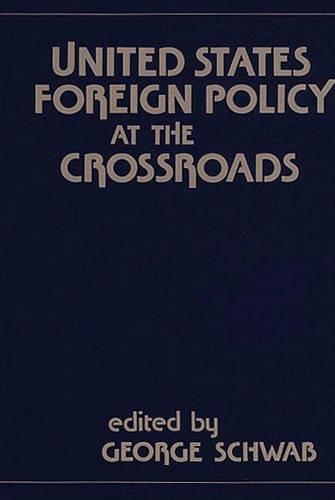
United States Foreign Policy at the Crossroads
(Hardback)
Publishing Details
United States Foreign Policy at the Crossroads
By (Author) George Schwab
Bloomsbury Publishing PLC
Praeger Publishers Inc
24th November 1982
United States
Classifications
Tertiary Education
Non Fiction
327.73
Physical Properties
Hardback
268
Reviews
"This book, edited by historian Schwab, utilizes papers prepared for a conference on US foreign policy issues. The opening essay, by Arthur M. Schlesinger, Jr. ... argues approvingly that [Hans J.] Morgenthau's brand of realism' has triumphed over assaults from idealists, ' behavioralists, ' and revisionists.' Walter LaFeber's essay, summarizing US foreign policy from 1945 to 1980, contends that Cold War I gave way to Cold War II sometime around 1960, with Cold War II featuring new perceptions of the USSR and a growing emphasis on economic issues, but also a fractured American political consensus and weakened central government. Editor Schwab's own essay calls on the US to lead in forming an expanded worldwide version of NATO--to counter, contain, and reduce the Soviet challenge. Other contributors include Dankwart Rustow, William Diebold, John Herz, and Kenneth Thompson."-Choice
This book, edited by historian Schwab, utilizes papers prepared for a conference on US foreign policy issues. The opening essay, by Arthur M. Schlesinger, Jr. ... argues approvingly that [Hans J.] Morgenthau's brand of realism' has triumphed over assaults from idealists, ' behavioralists, ' and revisionists.' Walter LaFeber's essay, summarizing US foreign policy from 1945 to 1980, contends that Cold War I gave way to Cold War II sometime around 1960, with Cold War II featuring new perceptions of the USSR and a growing emphasis on economic issues, but also a fractured American political consensus and weakened central government. Editor Schwab's own essay calls on the US to lead in forming an expanded worldwide version of NATO--to counter, contain, and reduce the Soviet challenge. Other contributors include Dankwart Rustow, William Diebold, John Herz, and Kenneth Thompson.-Choice
Author Bio
hwab /f George /r ed.
